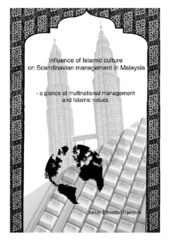| dc.contributor.author | Gjelsvik, Jorun Titlestad | eng |
| dc.date.accessioned | 2006-08-11T10:45:07Z | |
| dc.date.available | 2006-08-11T10:45:07Z | |
| dc.date.issued | 2001 | eng |
| dc.identifier.isbn | 82-8088-188-3 (electronic version) | |
| dc.identifier.uri | https://hdl.handle.net/1956/1721 | |
| dc.description.abstract | This study deals with differences ---especially related to the Islamic culture--- in business between Scandinavia and Malaysia. It is based on interviews with managers in 11 Scandinavian companies located in Malaysia. Globalisation is described as the intensification of worldwide social relations which link distant localities. Local happenings are shaped by events occurring many miles away. This is especially true for the multinational companies. Global firms have increased very much in numbers lately and their activities have become different than before. The multinational companies have branch-offices situated far away that all are affected by what is happening at the head-office. At the same time they are operating in a foreign culture and have to adjust to the local environment. As a result of this, both company management and scientists have started to focus more on intercultural relations when conducting business internationally. Islam is a very important part of being Malay and a foundation for the nationality feeling. There is an ongoing institutionalising of Islam in the nation. In Malaysia, Islam has grown stronger and got a more visible expression in the society. The things that influence the companies directly are outward symbolic actions of the faith. One of these things is the clothing tradition. The companies had to adjust their clothing policy since the Muslim women often wear headscarves and loose and covering clothes. Food is a part of business life and the Muslims also have to eat meat that is slaughtered in a special way. In Malaysia the food-issues went smoothly and overall the Scandinavians were reminded of it and also used to take halal-food. Important rituals in Islamic culture are the five pillars. Of these only two made any difference to the companies: the daily prayers and the fasting in Ramadan. However, they did not have a large impact for most companies. The daily prayers were mostly noticed by the fact that the companies had to have a praying room, and that there were shorter working-days on Fridays. In the fasting month the companies that had much physical work ---especially outdoors--- experienced a drop in productivity. The other companies did not notice the period that much. Indirectly, the religion affect underlying structures of people’s consciousness and their behaviour. This can have results as a hierarchical structure of the companies and their way of working. Underlying structures in politics that affect the framework conditions for the companies, however, in Malaysia politics were regarded as secular. | en_US |
| dc.format.extent | 1653529 bytes | eng |
| dc.format.mimetype | application/pdf | eng |
| dc.language.iso | eng | eng |
| dc.publisher | The University of Bergen | eng |
| dc.title | Influence of Islamic culture on Scandinavian management in Malaysia - a glance at multinational management and Islamic values | eng |
| dc.type | Master thesis | |
| dc.rights.holder | Copyright the author. All rights reserved | |
| dc.rights.holder | The author | eng |
| dc.subject.nsi | VDP::Humaniora: 000::Teologi og religionsvitenskap: 150::Religionsvitenskap, religionshistorie: 153 | |
